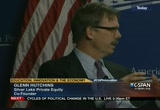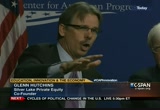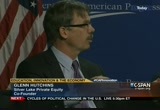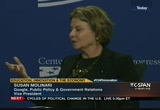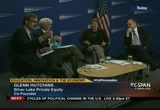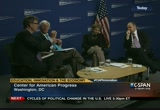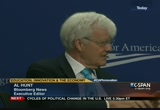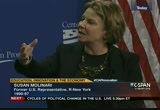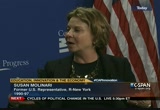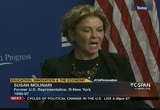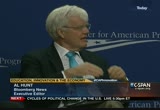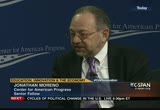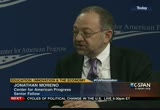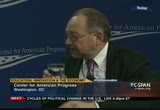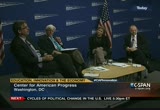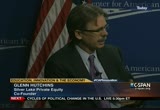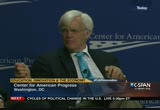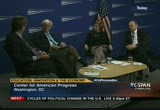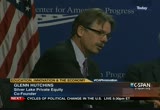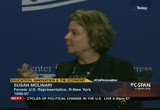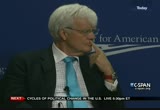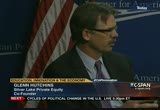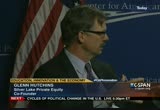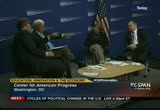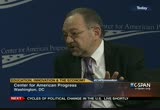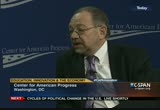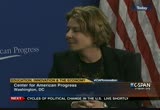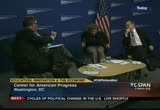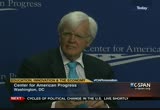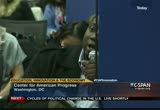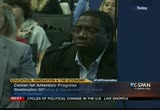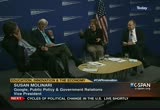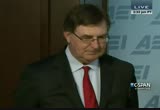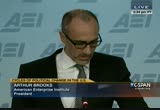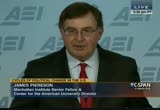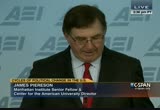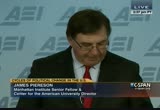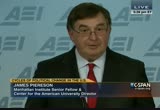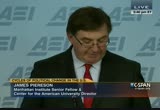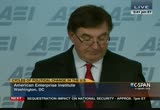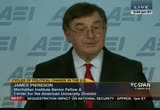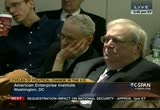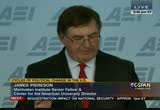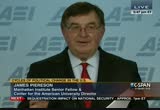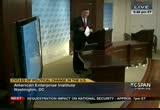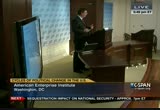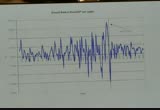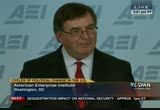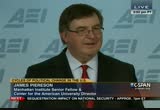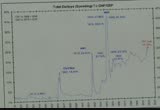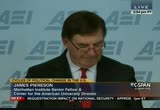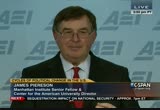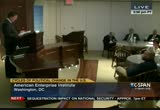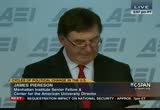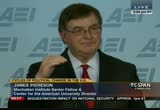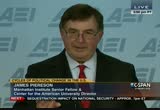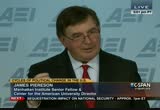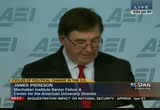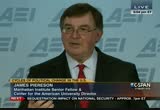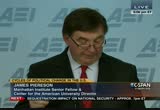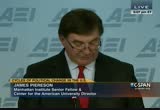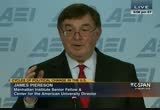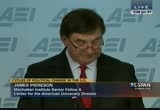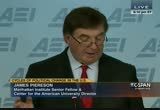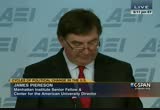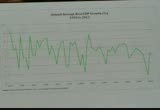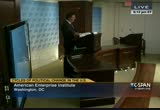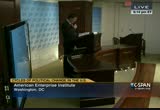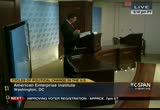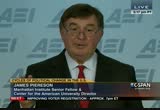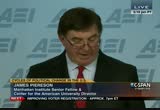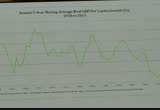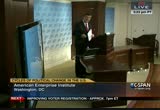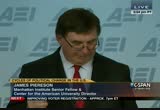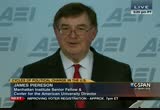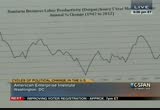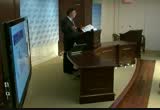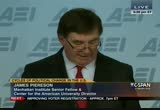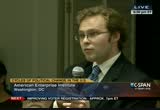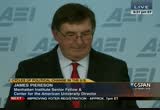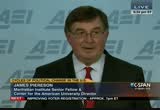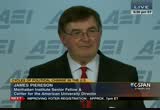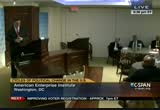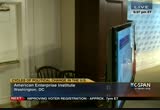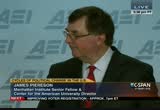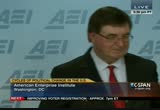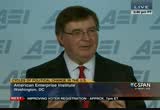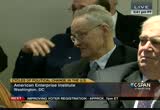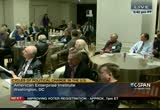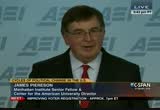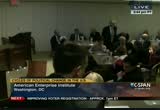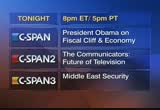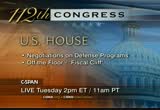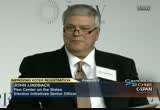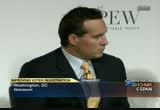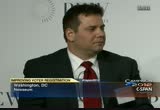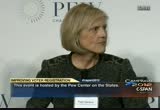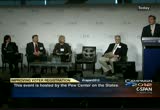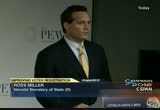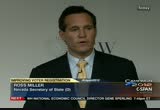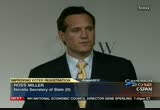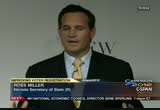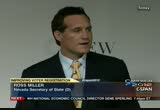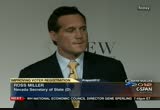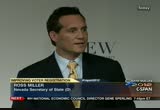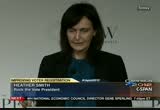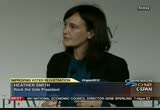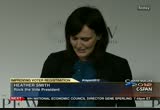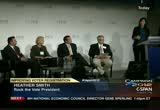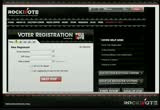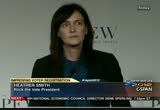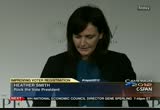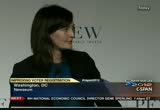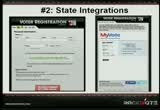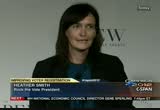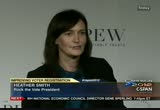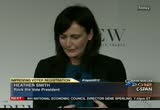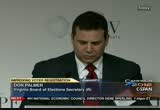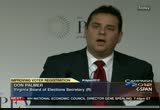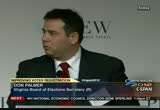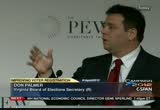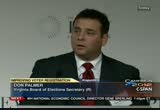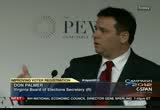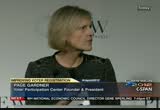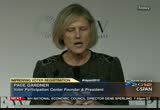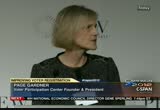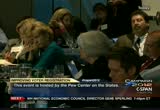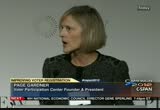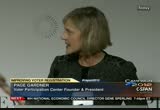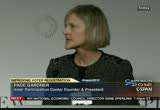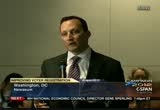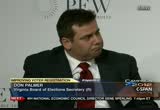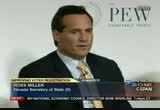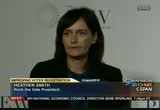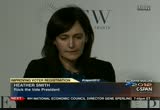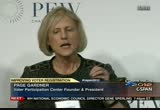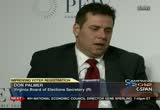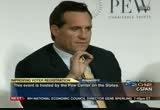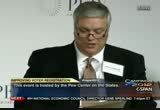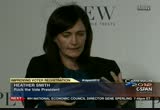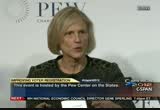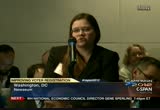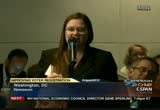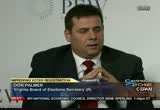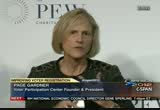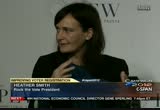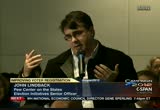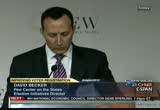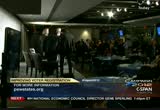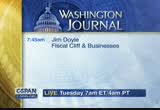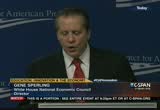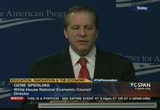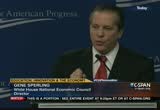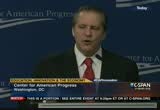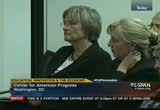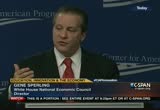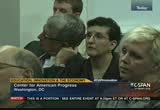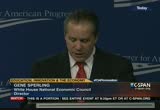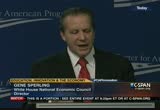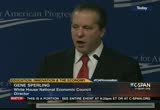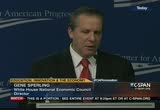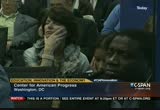tv Public Affairs CSPAN December 10, 2012 5:00pm-8:00pm EST
5:00 pm
its control is the fiscal clit. there is nothing more important today than doing that. this is all very public. i have met with the president -- i am involved in this issue. everything else is waiting in i wanted to make sure. >> it is done. not sufficient. i have never been with bain capital. >> i give you a reflection we get back to specific policies. this is an interesting place to be. when i agreed to go to brazil six months ago, if you told me the u.s. had just run faster, -- grown faster, 2.7%, we're
5:01 pm
expecting the u.s. economy to grow to%. the reason i raise this is to go down there and talk to policy makers and business people. we could have more taxes here, more regulation there. a little more cost of labor here. and a fair amount of uncertainty and take on one of the great economic miracles. they understand this thing they have a great economy growing rapidly is fragile and requires government to facilitate rather than later uncertainty. that is almost like a test tube of forcing. we had a time in which we had a huge amount of uncertainty. comes from -- some comes from government action.
5:02 pm
we had an aggressive regulatory agenda. we have not made a certain investments we have made. you add that up and you have a period in which businesses are operating under huge weight. creates the conditions under which businesses can operate in intellectual freedom. among the things government can do is create the conditions under which cost [no audio] to allow businesses to innovate. >> one of the statistics i looked at how to do with
5:03 pm
reducing regulatory barriers and i thought this was amazing. 20 employees spent 36% more to comply with regulations and that goes to the heart of what we consider to be the innovation story in this country. the small startup and that is what we're looking for as we look for the next big economic success story are the start-ups. the serbs that may have been around for a while. -- startups that may have been around for a while. as they increase their potential in terms of global exporting. they had such an attempt -- a bit depressing impact. that is something that government can do. they can really produce benefits in terms of the additional uneconomic. >> once you get to the fiscal cliff there is a clear innovation agenda.
5:04 pm
and the conditions we will have as a result of the fiscal cliffs did get out that. the first one will be immigration. we agreed and a lot of people say how are we going to compete with china and we can have the entire world at our disposal. under which the best people in the world can come to the u.s. and start businesses. >> then we have to focus on a special in the corporate tax reform to get the system which is simpler and promotes efficiency and these are for american businesses. then we have to and that will -- efficiency will be enormous. the next is an infrastructure investment to be made. in the context of the budget
5:05 pm
deal we are getting where we will spend less going forward. we have to think about what our values are and the most important things we can spend money are on infrastructure to make investments in the future rather than have short-term spending. and twin that with support for research, basic research and higher education and for education. if government does that and create some certainty, tell us what it will be. with respect to health care costs and energy costs. and then i think it will create the conditions under which businesses will be able to create a renaissance of american competitors. i think that is a brilliant agenda. i think we have agreed that as the distinguished alumnus of harvard said washington as a
5:06 pm
town with northern charm and southern efficiency. let's assume we go through the fiscal cliff. immigration, corporate tax reform, and investments. emigration, you're not doing the dramatic. vietor due to comprehensive immigration but we did not have a chance to do it. both wings cayman decided it would sabotage it. maybe republicans learned the lesson but i am not sure how much of a lesson. the way that was financed was through the corporate tax increase but there -- that had people on both sides will in to work with the white house and congress. when you talk about infrastructure spending and investments in things we have done with nih, all the talk now is about death.
5:07 pm
>-- how do you do what the ambitious and admirable the agenda envisions? >> will have the discussion of the debt ceiling again in january. we're not getting away from the somewhat of a doomsday scenario for quite some time. which would allow us to get to glen's position. it is important because the priorities that you outlined are not partisan. people did not have a disagreement as to whether the federal government should have a role in immigration. the federal behrman having a role in infrastructure, there are conversations out there that do divide the party is in terms of what is government policy role and what is not.
5:08 pm
i think glenn has talked about is and how you get there? the bottom line is that the united states congress is very disjointed because the american public is disjointed. when the american public -- this is the town that is responsive to what their brokers tell them. people did not come here and say i will disagree with what my constituency's tell me to do. we would hope when requires leadership because they get more information that they rise to that occasion. i do think that what is important, we're going to get to that point of these four or five things. more people need to talk about it. having glen on this panel enunciate those four or five things is important. it is a campaign that needs to be weighed, to allow people in
5:09 pm
the center of this political parties however many that is these days to have that conversation. it is a lonely center. to have that conversation, to enunciate it is something that needs to be talked to him and explained in terms of -- i do not think it is something that can happen tomorrow. cannon happen by the end of next year? parties are scared enough about -- how tumultuous politics is. the pendulum is swinging much more rapidly. i think there will respond more quickly if we can get them and has been so long that we have had this discussion because we talk about debt and deficit which is important because we talk about how to balance the budget. well-stocked about talking -- stopped talking about what
5:10 pm
investment means. itthe conversation has to take place again. they have to be applauded by their constituents. >> a dialog -- and has been an incredibly important government. i do not know anybody who would argue that was anything but a great investment? >> they will dollar is less than it was 19 years ago. -- wherenment's drifting below 2.7%.
5:11 pm
the best thing is to get around 3%. we're not moving in the right direction. i was thinking about my own case. my father got here in 1926. prodi because he owned a patent in austria. it was bought by a company in ohio. he did not have a pfennig to his name but this company in ohio paid his boat ticket so he did here in january 1926. he became a psychiatrist instead. but nonetheless, in his own way he was part of the growth of the american middle class.
5:12 pm
creating the conditions -- it really does lift all those. i am reading an important book. one of the points that make is the attempted sovietization of central europe, they tried to empty at the universities of historians and philosophers and they were pretty effective. they got them to go west or the exiled them in some way internally. they encouraged more science and engineers. there were not going to create the environment where they would do more work.
5:13 pm
i am very disturbed and i want to say that one great state inner city is talking about incentives as against creating disincentives. you have to have people who are the imaginative and can look beyond the current crisis. that also has been part of the american middle class. >> i would like to see that -- more of an emphasis on science and math. in terms of k-8th grade. >> one of the great stories of physics, a young physicist who had learned, they started going back to questions of the
5:14 pm
uncertainty and they became more philosophical. this creates the area for areas of physics in the 1970's. you're not thinking about the deeper ideas and not setting up the framework for thinking operationally. >> do you want to pick up on any of that first? >> only for one thing. i fear that we have a burgeoning student loan problems in our country. it is the only form of consumer debt that has increased substantially. it is by definition subprime. if we look at it on apple's bases, you do not have to pay interest when you are in school.
5:15 pm
there are very high default rates. i worry about kids. i think it is great. i studied in the social science s but i worry about the kids who are getting our literature courses in universities that do not have the same level of prestige. the call -- come from small private colleges and cannot get jobs. replay their student loans? -- can they pay their student loans? wilson need to think about people's employability and not people who went to berkeley and harvard and stanford but people who go to other kinds of schools and preconditions under which they can have personal
5:16 pm
balance sheets that allows them to prosper. >> everything needs to think to be able to write. well glad that penn is represented. >> they feel they have to charge? the kid will end up with debt. public education is coming back. it is a terrible sways. >> it is important, what some of the work is being done at not just community colleges but the extension schools and a great inner cities. we talked about the dangers of universities -- that is important -- to treat the
5:17 pm
ability of schools to teach kids things that local employers need to have to be employed. and while they're there capturing a teachable something about shakespeare and the constitution and make them good citizens but give them skills that allow them to support themselves in the marketplace of the future. >> which is why community colleges have been an engine for economic growth. one of the mistakes we make we talk about the full range of this which is spending on research and development, supported universities, more money is better. what we think about is less money is better. the more efficient you allocate your resources, the more you get for your research dollar. it is -- the reason there is so
5:18 pm
much innovation because it is cheaper to start a business. so let taken the cost down enormously. there is a way in which through the use of the extension schools and online education, there are important ways that we can reduce the costs. and create the opportunity for kids. we have a huge -- 40% of the workforce has been unemployed for more than a year. that is a group that has to be retrained in important ways. we can use -- to that in a much cheaper way in a different model with more connections to industry. >> one of the other statistics
5:19 pm
are brought with me is we're spending more money. our science and mathematics have lined. kids are doing what they have done since the 1970's. we have not matured. i am not that familiar with the education act. google is spending a significant amount of money to see we can do better. what the big frustration is what we talk about education but many of the other social problems that we talked about, when you see that there is such a dramatic technological change and we have not done anything to abandon our educational
5:20 pm
system. we can see is their ways that we can use these ongoing on-line resources to reach kids and get them to think beyond, to do that type was of things to introduce them to worlds beyond our borders. there are opportunities to shake things up and to cut some of the costs by allowing kids to enter world's and realms of the have never been allowed to enter before through technology and we need to spend more time figuring out how we change that paradigm if we know it. particularly for the pre-k through high-school. how can we learn better based on what we know today? >> let me try two more before we open it up to questions. warren buffett says tax rates do not matter as much as a lot of
5:21 pm
people pretend when it comes to companies and investment and innovation. i suspect you disagree. >> it seems at odds with the buffer role which suggests that taxes are important. for government to have revenue. business people who oftentimes say that that tax is that matter. and then you get one level and you are given a spreadsheet or you are given a result. in the calculation is a whole lot of things like taxes and other costs that go in. if you run sensitivity on analyses, you have a different outcome. you're looking at broader
5:22 pm
innovations. taxes are embedded in the analysis. we have a corporate tax code. one of the things -- opportunities we have in the budget deal is to get the revenue today. and then deal with reforms that are revenue neutral tomorrow. that is an opportunity for -- no one is talking about getting revenue from corporate taxes. we have a whole -- a whole bunch of features of the corporate tax code which significantly influence corporate behavior. it is not about revenues. every year, something has been added. like the house you buy with three different plumbing systems. it is time to do the gut renovation.
5:23 pm
everybody talks about the cash. in lot of this cash is offshore -- a lot of this cash is offshore. a whole bunch of reasons why that is. it is an example of a big outcome of difference. that's not the ideal thing from a theoretical point of view. one thing, the see a lot of american companies buying foreign companies because they are using 65-cent dollars to make acquisitions. that is an example. there is a distortion that would be ideal. >> one final question. a couple of things you would
5:24 pm
like to see the government do. what other areas do you think government could do to better encourage and facilitate innovation? >> i will not talk about spending more money. i would like to see more investment than is in the president's budget. there is one think that government can do and our leaders have not done very well in many cases in the last 10 or 15 years and that is say good
5:25 pm
5:26 pm
respect to the stem cell issue that has discouraged people in the sciences and a feeling that our leadership is not saying the right things about the importance of science. >> and perhaps encouraging some young scientists to go elsewhere. >> there are some scientists that feel as though there may be a future in those fields. >> we have time for a number of questions. >> i want to jump in. i do think getting over the fiscal cliff, the deal getting closer to balance the budget is still very important. i do hope because of the discussion that tax reform is something that is taken seriously for this year.
5:27 pm
i think that is well overdue. there is not time to do it before december 31. it will give businesses a lot of assurances that the government is paying attention to what they are saying. >> you should tell barack obama to find a jim baker. >> think about each time we have reached a crisis point in our country there's been an institutional response to it. we created a central bank. that has proved to be enormous for the past five years and important for years before that.
5:28 pm
post-world war ii, we create a system and the department of homeland security. i wonder if there's not an institutional -- >> some did not work as well as others. >> that is exactly right. it reflects our values and the focus of the government. we should have a department of homeland prosperity. we need somebody other than the president to think about american competitiveness. something we've taken for granted because we were the premiere at economy in the world. we to reinvent ourselves -- we
5:29 pm
need to reinvent ourselves. >> we have a bunch of questions. do we have a microphone? the judgment on the end. >> hi. i had a question for the panel and the president of harvard. looking at demographic shifts. you are talking about innovation. the application of some of your technologies and innovation. people utilizing technology to boost their awareness whether they are musicians are using google or youtube. how do you see people taking
5:30 pm
advantage and that are not graduate at a high enough rate but have the ingenuity? i have covered these people to a 50 cents to a jay-z. people are forming at the wayside but present a challenge moving forward because these will be the majority of children coming out of the demographics where outcomes are not to the level of being able to apply to a harvard. >> i cannot disagree with your underlying assumption. we have performers who would
5:31 pm
never have been able -- performance, thinkers, people who want to provoke discussion -- would never have the platform before and now it is fair and it is not costly and it is the great equalizer from a musical or idea perspective. i think this is something that will accelerate. i do not have the answer to the equalization and education. we will discover something that allows people -- to influence, you have to have a channel of communication. there is a channel of communication to almost everyone in this country via cell phone. how you do it -- this conversation of communicating
5:32 pm
the way we think and how we can use our mobile devices to reach those kids that might not have the structure that we have been thinking about influencing. so i do not know the answer but i know that technology is there and somebody has to do a little more social science in terms of how to take advantage of it. i do think the future use the opportunity for us to stake their claim because we are in this era of equalization with regard to an ability to access
5:33 pm
-- >> we take you live to a discussion about cycles of political change. the ways in which debt and the birth of the baby boomers can lead to political change. >> he has spoken here a lot of times and a lot of you have seen his work over the years. this is an especially important topic given that many of us believe we're at an inflection point in american politics. many of us hope we're in an inflection point. aei started in 1938 in circumstances that look like today. many of you are better historians and i am. in 1938 we had a persistent, dogged recession that seemed to be exacerbated by poor public policy.
5:34 pm
by 1938, the economic growth rate was -3.4%. that is the year that aei was started, in reaction to the poor policy and leading to the malaise that was part of the great depression. it was the belief that the a mess tradition of washington was using the recession, the ongoing depression as a pretext to turn the american public against the free enterprise system. and was doing so with the tools of class warfare. this sounds similar to today and it was the belief of our founders that unless something changed, something big was going to happen and something bad to the american economy and american society. something big was about to happen in 1938. we hope something like that will not happen today. we will get a view of the speaker about what the next great revolution will look like
5:35 pm
in american politics. jim harrison is the -- has been a leading voice in the conservative intellectual movement and a central figure fronter p and higher education. we are honored to have him here. [applause] thank you. it is a great pleasure to be back, to renew a friendship that gernsback 30 years or more. this is the place where as a younger man, my intellectual heroes spend their time. walter berns, arthur burns, it is a long list. i am delighted to see you keeping up the fight. in -- i appreciate the
5:36 pm
invitation. thank you for your help in arranging the slides for me. the article on which the stock is based appeared in the june issue of the new criterion. i delivered it to as a lecture last kory. at the time, i expected and as i said in my lecture and it is in the printed version. i felt it was likely barack obama would win the reelection. the kind of fame that i am developing does not depend on the recent election. speak aboutg to barack obama.
5:37 pm
we had a fair amount of good luck and an economy that -- is not the future figure. will have to see about that. thank you very much. the u.s. has been shaped by 3 for reaching political revolutions. jefferson. revolution of 1800. the civil war and events surrounding it and the new deal. events of the new deal extend through webre ii in my opinion. each of these appeals concluded with lasting institutional and cultural adjustment for faces in economic development. the u.s. could not have
5:38 pm
developed into the multiracial, multiethnic superpower that we know today without the appeared full -- upheavals that facilitated prentixx biogen and laid the basis for the regulatory and entitlement state in the 1930's and 1940's. are we on the verge of a new upheaval, a fourth revolution that will reshape politics for decades to come? there are signs that suggest we are. what kind of revolution or people? barack obama and his supporters with the reelection campaign behind them are entitled to think that there coalition is the way of the future. there are demographic trends to support that interpretation. mr. obama likes to think of himself as a revolutionary figure on the order of abraham lincoln and franklin delano roosevelt. and there are counter weighing
5:39 pm
forces. then there are the irresistible economic and financial realities. the u.s. government have bird itself to the hilt. the american economy is no longer growing at the rates of a few decades ago and certainly not at the rates of the 1950's and 1961 our entitlement programs have solved to the public and installed. it is hard to see how any new agenda can be paid for. it is hard to see how those are in place. barack obama may represent an era that is ending rather than one that is beginning. we have found it difficult to imagine a future of people that might undo our present system because we assume the welfare
5:40 pm
state as we know it is an historical destination. beyond which there lino political possibilities. to much hard work and political reform -- we have arrived at a history. where have we heard that before? where the future can be seen as a gradually improving extension of the present state of affairs. this is the conventional view and for many is comforting. one systems have been in place there is a tendency to believe that there natural, permanent, or eternal. we should bear in mind that something similar is -- was believed not all that long ago. there is a point made by nicholas tallob.
5:41 pm
almost everything in social life is produce buyer rare but consequential shocks and jumps. almost everything studied about social life features on the normal. we're fortunate to live in a time when changes taking place in gradual and incredible steps but not always. there have been many wise men who have gone wrong by making projections from current trends. a war among the european powers was inconceivable, it was believed. vein forecasting a fourth revolution, one must avoid any implication that it is time to
5:42 pm
start stockpiling canned goods and powdered milk. it could launch a new chapter of growth and that is much to be held for. we will have to go through a difficult path before arriving at the destination. we're obliged to remain optimistic even as we ruminate about impending disasters and peebles. the u.s. has survive such an event in the past. it could do so again. so notwithstanding its reputation for stability and continuity with the world's oldest written constitution, the u.s. resolved its deepest problems in relatively brief periods of intense and destabilizing conflict.
5:43 pm
these are what have been called circuits for revolution. rather than overthrowing the constitutional order, they adjusted the circumstances and inserted new forms and meanings. more than simply electoral realignments, their fundamental changes in national regime. being defined as a system of law and policy to standard time by a durable coalition of supporters. and america -- political parties have supplied that durable coalition of supporters. there are many reasons why the american system adjusted in a discontinuous fashion. the system with its dispersed powers resists preemptive and overarching solutions to committing problems. hard decisions are postponed and picked -- kicked down the road. america's dynamic economy and society are constantly bringing forward new challenges to which
5:44 pm
the political system cannot easily respond. at times these challenges have accumulated to a point where the differences between the parties and interests have become so fundamental as to defy efforts to resolve them through established channels of party competition. the new institutions must be invented and new coalitions assembled to address them. that may be a destination toward which we are headed today. over the course of its 225-year history under the constitution, the u.s. has been governed by three party regimes. a democratic expansionist regime from 1800-1861 it dissolved in the slavery and recession crisis. republican capitalist regime from 1865-1931 it was discredited and overthrown by the great depression. a democratic welfare regime from
5:45 pm
1932 until the present albeit with faltering support after 1980. these regimes were organized around quite different principles of national development. they achieved important goals for themselves and the nation at least for time. the jefferson-jackson regime for rudder document -- democracy for white men. their enterprise foundered on the issue of slavery in the territories and southern nationalism. when you think about the jefferson-jackson party formation, what they achieved was truly epic. they took a country of 5 million people in 1800, modeled along the eastern seaboard and gain
5:46 pm
control over the entire continent from the atlantic to the pacific. there is no possibility that americans could settle all that territory at the time. the u.s. gain control of the arizona territory in 1946 but it did not become a state until 1914. the louisiana purchase jefferson arranged in 1803, the only began to settle it in 1850's when they saw every issue tore the country apart. the republican regime from the 1860's on board or could straighten the industrialization of the nation based on the concepts of economic liberty, the protective tariff, and the gold standard. in 1965, the u.s. was an agricultural country of 30 million people. in 1930, it had a population of 130 million people and was highly industrialized and probably the most prosperous country in the world so that was not [inaudible]
5:47 pm
by americans at the time. both platforms of the republican and democratic party -- the economic doctrine was based on four pillars, the gold standard, protective tariff, export economy, and control over the national market. it seems odd they should have fought -- the party should have fought so hard over issues like the tariff and the gold standard. the democratic party in the late part of the 19th century was determined to overthrow the gold standard. that was what the populist party was about to inflate the currency. we talk about civility in politics. if you read the party platforms of the democrats and republicans to drop this time, it is anything but simple.
5:48 pm
the other side will destroy the country so you should elect us. support was the attempted through federal spending. i have a chart that details the political strength of these three parties through these different periods so you can see the party of jackson dominated national elections. it was not an oscillation of power back and forth. these parties controlled the system. it was true of republicans and fdr and the democratic party. this is the point that i would emphasize and it may be relevant to what happens to us today.
5:49 pm
ladies and the circumstances, the dominant party controlled the system and they want a whole series of alexian's. jefferson's party won six straight contests from 1800-1820 and republicans won through -- democrats won through 1948. this was necessary to break through and take the country in a different direction. one of the difficulties will have is we will have a sustained still made in america that will make it difficult for us to change the path we're on. that would be an extension of what we have seen in the past. those lines there -- those are
5:50 pm
percent changes annually in tepee, gross domestic product from 1790-2011. i'm not sure why i am putting this up for you except to show that, i will make a couple of points here. look at the oscillations of the 19th century up and down. we have periods of tremendous growth followed by depressions and recessions. we had panics continually in the 19th century. there were seven or eight of them over the course of the 1800's. in america, we have had since the debris -- the great depression, we just had won a
5:51 pm
few years ago. if you look at the oscillations in the modern period here, these are much less from year to year. the ranges are much less than they were in -- than the war in the early years. if you spoke to an academic economist there would say that is the effect of cannes -- keynes. that was the idea of the keynesian idea, to stabilize the booms and busts of the economy. with the kind of welfare state and and terman say we have today, i will not talk about foreign policy and the national situation, but what we have today where the modern store --
5:52 pm
state is joined at the hip with the capitalist system. we cannot pay for all the obligations and promises it has made without a highly performing capitalist economy. throughout the 19th century, the u.s. government was spending something like 2% or 3% annually of gdp. we had a continuing series of depressions and recessions without effecting the party system or the portents of the political party. the republican party won in the deepest depression of the 19th century. admittedly, they stole that election. [laughter] nonetheless, it had to be a close election before they could
5:53 pm
steal it. if you know what i mean. i put out there a chart going back to 1790. that is u.s. government spending as a percent sign of gross domestic product. you can kind of see that her the 19th century, that spending was very low. paid for by the tariff, basically. one of the fights they had through the 19th century is whether or not the tariff should be used to protect manufacturers and labor unions and workers or whether it should be used to raise revenue to pay the expenses of government. the republican doctrine was protection and the democratic party had a different view. you can see the ratchet up the 20th century.
5:54 pm
every time we had war goes back up. and then you see the kind of continuing ratcheting over the last 30 or 40 years. right now we're close to 25% of gpa in terms of federal spending. that is because the economy is awake but we have been spending a lot. there is some obvious parallels in the structure of these events that might provide some clues as to what we might look for in any new people. the pivotal events, jefferson's revolution and the crisis of the 1930's extended over section -- several election cycles. the cycles that emerged -- each segment ended with the ouster of the parties that had dominated during the previous year and each change brought in a new set of governing elite.
5:55 pm
immigrants were an important factor in some of these elections. certainly in the roosevelt coalition, immigrants were an important aspect. abraham lincoln also and the republican party in 1850's made an effort to win the support of newly arrived immigrants, many of them irish, scandinavian, german. he fought back against the known -- the know nothing party which was an to catholic and anti-immigrant -- anti-catholic and anti-immigrant. i need situation, the newly dominant party hadn't early run of success that prevented -- had an early braun of success -- run of success. each of these realignments was carried out and maintained by
5:56 pm
one dominant political party. following 1800, jefferson and jackson, their party define the parameters of competition until the slavery crisis of the 1850's. in the midst of the great depression, the party was organized around national regulation. the democrats completed this revolution after world war ii when the u.s. began to assume responsibilities of the international arena commensurate with those it assumed in the domestic arena. the new deal would have been incomplete without the settlement of a war that ended with the u.s. as the dominant power. europe and japan on their backs and the u.s. dollar as the international system's reserve currency. that is vital to the system
5:57 pm
we're in. it is not just the 1930's and that new deal. the dominant parties might be called regime parties. there were able to use their political strength to implement and caring for the basic themes around which these political settlements were organized. jefferson's party put forth a teams of democracy and expansion. after are the themes of national regulation and internationalism. the u.s. has rarely had a two- party system but rather, a one and a half party system consisting of a regime party and a competitor forced to adapt its dominant position. these competitors, the whigs of the 1840's and the republicans of the post-war iraq occasionally won national
5:58 pm
elections. it is interesting to read the platforms of the democratic party in the 1840's because the assault the whigs for copying them. that was the case. the federalist party which died era,n the jefferson nian did not try to do that and they did die out. issues developed that could not be addressed within the existing structure. such issues tear apart parties in the interests associated with them and promote a new politics of invention and creativity. thomas jefferson and james madison and then to the mass political party as the instrument by which they
5:59 pm
defeated alexander hamilton and its mercantileless policies. they thought the party should wither away once its purpose had been accomplished. during jefferson and madison, they developed a sophisticated theory of parties in the 1790's and madison wrote in fairmount about this. his idea was that a republican service was district separation between society and the state. and teh state -- the state has to be accountable to civil society and this is done through the representation system. hamilton was trying to build a party in the state, they asserted, and the state would a san the kind of direct and control under the -- over the underlying society which is why jefferson and madison asserted this was monarchical.
6:00 pm
this is what they said. jefferson and madison drew their imagery from great britain and the rise of the country party which attacked the bank of england in the midst of the south sea bubble in 1720. all the imagery is there. there should be lower taxes, never be a standing army, we should fight against corruption in public service, there should be rotation in office. this became the doctrine of the in that sense, they were what you might call a country party -- they represent the hinterland fighting against the capital. that's what that party was. jackson had an irrational hatred of the bank of the united states. in some respects, i believe the republican party today has some aspects of the country party. that is to say it doesn't
6:01 pm
control politics in the capital, it fairly weak in the great metropolitan of boston, new york, l.a., and as a consequence of that, it can win elections but it always has difficulty enforcing the elections. it is somewhat ironic that party fell apart because of the slavery crisis. it was responsible for the whole idea of expansion westward and it was the issue of slavery in that territories -- what will the state is in the territories be? it fell apart as a consequence of its fundamental basis of american expansion westward. the whigs and the republicans were more or less opposed to
6:02 pm
expansion because they saw the expansion of slavery. in 1930 and 1931, republicans in the midst of the depression may have made the economic slump worse by doubling down on the terrace and the gold standard -- to colors of their post civil war policy that proved successful in the past but that were of doubtful at the sea in the new circumstances prevailing after the great war. what do i mean by that? the gold standard and the tariff worked as long as america is an out liar in a european dominated system. this is true all the way up to world war one so that the european powers to not necessarily retaliate against the united states or its terrace, but after world war
6:03 pm
one, european countries were flat on their back. with the united states installed a tariff, they retaliated. one of the things that happened after that was international trade cycle straight down and that contributed greatly to the great depression. this is not unusual. political leaders will typically go back to what has worked in the past, often unaware what once allowed those measures to work no longer prevail. the question then is whether or not the party system formed in the '30's and '40's is about to exhaust itself in some new crisis much as these systems expired in the 1850's and 1930's. i come back to these platforms -- the republican party platform in 1932 commented a great deal on what democrats have done in
6:04 pm
the previous congress and you can see this team coming off the pages when you read the platform because they could not believe the democratic party was actually going to support a fiat currency. in other words, get off the gold standard. they could not believe they were in favor of deposit insurance. these were outlandish ideas in the eyes of the republican party and these have been ideas that had been at the core of the party for a long time. you wonder why they were opposed to deposit insurance -- for the reason we question it today, because moral hazard it encourages in terms of bank lending. the democratic party emerged in the 30's and 40's by building majorities around claims that it pulled the country out of the depression, when the war against fascism, and defended the working and middle-class. these were meant this
6:05 pm
achievements. the democrats won five straight elections from 32-48 and controlled the congress all the way up until 1980. republicans won control in two congresses -- in 1946 and 1952 elections. otherwise, the democrats controlled congress this whole time. the major policy achievements, social security, medicare and medicaid were widely popular. given the popularity of fdr and the new deal, republicans have little choice but to accept the general contours of the new regime. following their landslide defeat in 1936, republicans nominated a succession of candidates who did not challenge the new deal programs but promised only to administer them more effectively. among republican candidates between 1940 and 1980, only
6:06 pm
barry goldwater sought to roll back the new deal and his defeat in 1964 is taken as evidence of the futility of that approach. some say the new deal alignment came apart in the 1960's and eventually replaced by ronald reagan's conservative coalition of the '80s. i do not agree with that. the protesters of the 1960's were not in revolt against the welfare state or the democratic party, but against the johnson administration's cold war policies. many of the leaders of the 1960's movement, like bill and hillary clinton, libertarians' at that time, eventually settled down as liberal democrats. as for the reagan administration, it's success in reviving the economy may have given the new deal a new lease on life wild and of the cold war took the national security issue off the table, much to the advantage of democratic
6:07 pm
presidential candidate to followed, like bill clinton. republicans have achieved draft electoral parity with democrats since 1980, winning five of nine elections and winning control of the house and senate for roughly half the elections. still, republicans never managed to reverse the flow of power and failed to eliminate or reduce the great society programs. federal spending grew nearly as quickly and republicans as democratic administrations. republicans have, on occasion, tried to balance the budget or tinker with social security and medicare but they never succeeded. republican governors and mayors, like their democratic counterparts continued to make pilgrimages to washington in search of subsidies for their states and cities just as members of congress in both parties run for reelection by pointing to the federal funds they have brought back to their
6:08 pm
states and districts. nor have republicans had much success in penetrating leading cultural and educational institutions on behalf of ideas that have wide support among voters -- college faculties and educational boards are more liberal today than they were in the 1960's. republicans have been eight -- have been unable to parlay their success and to influence over cultural, journalistic, and educational institutions. i think this is an aspect of regime politics -- once the party is able to take control of the system, that influence spread throughout the political system into university of faculties, editorial boards and cultural institutions. regime parties tend to push their influence downward and one test of whether a party has succeeded in gaining that status is whether they have that kind of representation. if you look around america now,
6:09 pm
the democrats largely have control of those institutions. conservatives have done something altogether different -- they created their own newspapers, magazines, think tanks and institutes. even colleges and schools to assert their own ideas and have performed their own counter establishment which with a inform their constituents and wage warfare against the democrats. they increasingly live in their own philosophical world's that drive them further apart and makes compromise more difficult to achieve. walter russell mead introduced a useful distinction between the blue stay and read state models of development. the parties are sorting themselves and to different states and regions where they can implement their visions of social and economic policy. the blue state model, the democratic model takes its inspiration from the new deal. it is based on the concept governments can't underwrite
6:10 pm
working and middle-class incomes by a regime of higher taxes and public spending on education, healthcare, welfare and public employment. the red state model as implemented in various republican states call for lower taxes, lower public spending as a means of attracting business and promoting growth. california, illinois, and new york are prototypes of the better -- of the blue state model. texas, arizona, and indiana are prototypes of the red state model. but when these tendencies are added up across the nation, they produce something close to a stalemate. the blue state model is collapsing because of a tight cost and the effects of the taxes needed to maintain it. this evolution has produced a volatile alignment between the two political parties, with each controlling different jurisdictions, each taking sharply different views of taxation and each communicating with its own supporters.
6:11 pm
if the blue state model is dying, it signals the end of public spending with which is associated. what are the reasons for thinking the new deal regime is in the process of dying out? these are familiar -- debt, democracy, slowing economic growth, augmented by political polarization and inertia. within a decade, these factors may overwhelm the system of politics under which we have lived since the 1940's. that is real per-capita federal spending from 1950 to the present. about -- about five times since 1950.
6:12 pm
what is that one? real gdp growth. that is obviously a problem. we have run up $16 trillion, nearly 11 trillion note to the public and five trillion to foreign governments, most of it to japan and china. or bonds with in those countries. the money owed to the social security trust fund has to be paid back in the future of general revenues. much of this deficit and debt was accumulated during times of prosperity from the '60s to the present. bill clinton had won in 1999 and
6:13 pm
lyndon johnson had one in 1969, but i believe john was able to achieve his because he changed the dates of the fiscal year -- he moved the fiscal year to october 1 to the 30 s and that enabled him to balance the budget. clinton did it legitimately, i think. but in other words, the keynesian idea was we run up a deficit when we have a swamp. we run up a large deficit when we have a slump and run up medium-sized deficits in times of prosperity. the u.s. government is spending about $3.6 trillion this year. federal spending has gone up at roughly twice the rate of economic growth.
6:14 pm
interest payments are temporarily manageable. but interest rates are at historic lows and likely to go up. our current situation is in no way comparable to that of the '40's when the national debt grew to an amount nearly equal to annual gdp. once the war ended, spending went down and the u.s. proceeded to grow at a greater than 4% annual rate for 20 years. that took care of the deficit or the debt with the problem. today, everything points in the other direction. interest rates are likely to go up. demand for further spending will increase for reasons i will get to a minute. state and local governments rely on federal transfers to balance their books. the state of california spends money out of the general fund and get money in terms of federal transfers from various programs. they depend on that money.
6:15 pm
i won't get in to the whole question of the public employee retirement systems and a lot of these states. point number two, the demographic trends now unfolding are likely to make a bad situation worse. we are deeply in debt. according to the 2010 census, there are 40 million americans aged 65 and over. this year, there are 48 million people drawing benefits from medicare and 55 million drawing social security benefits. all of people draw those benefits who are under age because of disability and other reasons. even with these numbers, these systems are having difficulty. still, according to the census, there are nearly 80 million baby boomers born between 1946 and 1963.
6:16 pm
the leading edge of which passed age 65 in 2011. the census estimates as they age, there will be 72 million americans aged 62 and over by 2027. 40 million to 72 million. if we had an increment to account for those drawing benefits for those under age 65, we could have between 80 million and 90 million people trying old age benefits sometime during the 2020. this does not include the 55 million people now trying medicaid, a number that could increasingly iff third over the next decade. we should not blame these beneficiaries. for the most part, they rely on these services and leaving social security aside, they received services, not money from these programs.
6:17 pm
the money goes into the pockets of the providers. i'm sure there's some corruption there but who wants to go to the doctor and hospital just to get that service? people generally don't want to do that. how will it be paid for? the census tells us there are about 158 million people in the u.s. work force. about 142 million are currently employed and 120 million have four times -- have full-time jobs. something like 20 million people employed have part-time jobs. the u.s. work force is expected to expand by 0.6% per year over the next decade. that's about a million people per year. this means on average, the work force will grow by a million people. those people won't necessarily all get jobs. while the number of people
6:18 pm
turning age 65 spans more than twice that rate. even if we assume an expanding economy and unemployment rate, the nation will reach a point where there are less than two people working to support each beneficiary. in other words, some 80 million people drawing benefits, medicare and social security against 150 million people working and paying payroll taxes. that is not a good situation. especially for young people out there like my son. then there is the problem of slowing economic growth which may be the most fundamental challenge of all. the u.s. needs a rapidly growing economy to pay for these expensive government programs and reduce the debt. yet decade by decade, growth has been slowing down in the usa.
6:19 pm
in the 1960's, real gdp grew by 4.6%. in the '70s, 3.7%. it fell further in the '80s, which was a good decade and to 3.2% in the 1990's. that's the average growth per year during the decade. following the technology bust and recession of 2000, gdp grew from 2000-2000 a at a rate of 2.6%. if we factor in the recession of 2008 and 2009, gdp grew at 1.7% for the whole decade. in the past three years, we bounce that of deep recession with only tepid rates of growth at around 2%. forecasters expect this trend to continue at least through 2013. beyond that, there is some divergence of opinion. you can see that down resulting pattern of those rates of economic growth from the 1950's
6:20 pm
and '60's which were two very good decades to the 80s and 90s now to the present. that is 85-year moving average of annual changes and real growth gp. it really goes downward in the last 10 years. that chart their is per capita gdp. that takes into account changes in population and, as you see, it's sloping downward at a steeper rate -- at a steeper rate. this should concern all of us, we have a situation where the demand for government are increasing sharply.
6:21 pm
there are those who think the u.s. economy can absorb the rising cost of government and it will return to a pre-crash trend of 3% per year. president obama's current economic report anticipates the economy will grow at 3% year at a 4.5% real clip for several years thereafter. in other words, rates we have not seen on a consistent basis since the 1960's. that is certainly a hopeful view. those are the rates of growth that could save us, but even so, it will pose some difficulties. robert gordon of northwestern university suggests in a recent paper the u.s. economy is
6:22 pm
unlikely to expand at rates of earlier decades, which he identifies, including a slowdown in innovation, the dissipating effects of the computer and technology revolution, the demographic trends that earlier and aging population. and a smaller number of people entering the workforce. rising inequality, the leveling off of the educational attainment of the u.s. population, and the burdens imposed by rising household and government debt. taking these headwinds into account, he thinks the headwinds -- the economy may grow in the future in real terms at a rate of less than 0.5% a year in real terms. obviously a nightmare scenario. at that rate, the u.s. economy in total would not generate enough income to cover the annual interest on the federal debt. that is a sour view.
6:23 pm
let's assume future rates of growth will fall somewhere in between these rosy and nightmare scenarios. we have those rates of growth between 2000 and 2007 and they generate substantial deficit without the complications we will soon encounter. that charge is real changes in real gdp per capita going back to 1950. that is a downward slope. not growing fast enough to absorb the increases in our population. those are all very difficult situations and it seems to me it is entirely plausible to think this combination of factors could bring down the new deal system. how would that happen? what if we can't pay all the
6:24 pm
promises we made? what is the political fallout as we began to renegotiate promises, not fulfilled promises, and so on. all this will go out into the political process and create contentious environment. the issue of gridlock -- one troubling feature of the current political regime is that control well-placed groups have over policy. the plaintiffs' bar blocks legal reform. environmental groups block and so on. this is an old story. these are what economists call rent-seeking groups. they seek to control the distribution of resources to secure income for the members but do not generate wealth on their own. economists suggested economies tend to grow more slowly as such
6:25 pm
groups multiplied and gain influence over the political process, consuming resources and blocking reforms that might promote growth. this is one reason he suggests the u.s. economy grew so rapidly after the civil war and why the economies of germany and japan took off after world war two. these conflicts destroy the network of interest groups that might have blocked growth and development. obviously, we don't want to have a war to clean out the interest groups system, but a political upheaval, a change in the party regime could accomplish that as it has done in the past. this is one of that contribution of americans party revolutions. the cleanup interest group systems and eliminate roadblocks, reform, expansion and dynamism. those are real advantages of the people.
6:26 pm
ladies and gentlemen, let's see what else i have here -- that is a chart on productivity. obviously, going down from the '50s and '60s, if we have a decline in work force in relation to people who are retired, he might wake up for that -- might wake up for that of the work force is productive. that is not really happen '90s and that usually attributed to the internet revolution. but that has burned off pretty quickly. that's a chart that shows that distribution of gdp by income groups and shows in the 1920's, the top 1% gain a disparate share of gross and gdp and i think we have the same thing going on in the current time. that is what gordon is speaking about when he talks about inequality.
6:27 pm
those numbers are artifacts to some degree and there is some fact that in the stock boom -- wealthy people tend to own stocks. they gain at the expense of everyone else. how do you deal with that of its power source of equality? we could have a stock-market collapse and the dow could go from 13,000 to 6500 like it did before. but we don't want to do that. it's been difficult thing to address. ladies and gentlemen, in conclusion, america's third regime has crumbled. with a listless economy and a stalemate of politics, america cannot begin to make good on the promises it has made.
6:28 pm
despite noble efforts, barack obama has not lifted the gloom that hangs over the u.s. economy. nor is there any real recovery in sight. it's a matter of time before voters look for a coalition that can restore growth and dynamism to the american economies. that they cannot be that far off. there are opportunities ahead. all the more reason to roll up our sleeves and get to work. what will america's for the regime look like? much of that work is yet to be done. one hopes it will take advantage of america's size, diversity, and abundant natural resources and far more abundant human resources. americans want to work. it's up to us to give them something to work for. but fourth regime should make use of the four s -- federalism, free and flexible markets and f
6:29 pm
racking. [laughter] let the federal system sort out the difference between the blue and red state models. but the real energy revolution, not the phony energy revolution paid for by stimulus fund, but the real energy revolution run its course. it might save us yet. let our entrepreneurs and workers face new directions and an american renaissance may be just ahead. by all means, let's hear no more talk of decline and decadence, the end of america, and all the rest. we have nothing to lose but our gains. there is a revolution to be one. let's get started. [applause] thank you. >> thank you very much for a thought-provoking lecture. we will now turn to your questions. after jim takes a few of your
6:30 pm
questions, we will have a reception in the lobby. there's already one in the back. >> fire away. >> thank you for that presentation. i'm a hillsdale graduate and a writer with the "washington free beacon. much has been made of the republican loss in 2012. do you think the next regime party could be a renovated republican party where we take the loss of 2012 and change everything around or do you think the democrats will learn from some of their errors in the past and reform their party? see that far into the future. i was not surprised the democrats won this election.
6:31 pm
you have to bear in mind that the economy collapsed under a republican president and it's going to take a while for the voters to forget that. the economy was not good under barack obama, but neither was it bad enough to drive him out of office. i would not over interpret the election. the republican candidate was all that great. i like mitt romney, but often, when we elect presidents, we let them for eight years. we oust aery often president after four years. it's on happened a handful of times. let's face it -- obama is a very gifted politician and he had some good fortune. the supreme court decision certainly helped him. the economy bounced back in the third quarter, it appears aided
6:32 pm
by an of spike in federal spending. he had some pretty good employment numbers. i would not over interpret the results of the election. i would suspect republicans will do well in the midterm elections and i would expect them to win the 2016 election. assuming they get a good candidate. >> i teach history at northern virginia community college. do you see any parallel between the whig party, which tried to be all things to all people, leaderless, and ironically the upstart, regional, singular issue focused new republican party. is the current republican party going to go the way of the
6:33 pm
whigs? >> i doubt that. there were a very weak party. the party developed as an anti- jackson party. that was about it. it won two presidential elections by mimicking the democrats. they were a national party. they ran in the south but they were torn apart by the slavery issue. the republican party and the whig party have that much in common. the republicans have been around and are deeply entrenched. but you do ask a good question -- where are the republicans going to get those votes to turn themselves into a majority party? ronald reagan did not really succeed in doing that and he had a very successful administration. one thing i learned in looking at these events in the past is that parties don't disappear
6:34 pm
because somebody has a better argument. they disappear because there is some tremendous upheaval or event in the society that destabilizes relations between the parties. it took a civil war and a great depression. it's interesting that ronald reagan, as successful as he was, we had 12 years of a republican president, we were not able to crack the whole new deal-great society system. that all survived. that's a testament to how deeply rooted those things are. when you look around and try to figure out what is the way out of it? when you see the control of the college faculties and tv networks, where they are and the key groups in washington and a big metropolitan systems, they have a significant stranglehold on this system. i have not thought through as to
6:35 pm
how that would happen. abraham lincoln, in one of his speeches in 1858 said the same thing about the democratic party and the control it seem to have a model system. as a consequence of being in control for so long. you could ask the question -- the republican party succeeded, lincoln seceded because -- succeeded because the south seceded. what if the south have not seceded? lincoln only got 40% of the popular vote. the democrats have a strong representation in congress. they could probably have checkmated of republicans. they might have kept slavery going another 40 or 50 years and that would have blocked american development. as it was, they could not build a railroad to the west coast and everything was hung up in congress over the slavery issue.
6:36 pm
the secession of the south in that sense, a tragic thing, but it may have than a positive thing. that event broke the stalemate in the system. i don't see anything now that breaks are stalemate. it would have to be a very large event, coming out of some of these trends i just discussed. good to see you, michael perry >> i'm from the "washington examiner." would it be possible in a fourth regime government to have federal spending be a lower percentage of gdp than we have become accustomed to?
6:37 pm
typically 18% and 21% and after what you call the new deal regime, federal revenues have never been higher than 20.9%, even during world war two and you are pointing to the contradiction between that gap between revenue and spending. but could it be possible to get federal spending down as a percentage of gdp? >> you just wrote on this. i saw your piece the other day and i was taken aback by what he said. it does tend to oscillate a little bet with the growth in the economy. the federal spending was very stable and from the '50s to the '70s, taking the great society spending into account, that the
6:38 pm
hard question to answer. if we could get some robust economic growth and have either gridlock in washington or a republican administration, we could have the economy growing faster than federal spending and you might be able to get it down, but you have the whole problem of the baby boomers retiring and spiking up spending. the democrats have baked in some increases in medicaid. medicaid had six or seven years ago, 35 million people on it. it is up to 55 million and the health care bill may drive up to as many as 80 million people in 10 or 15 years. they continue to rewrite all the regulations surrounding these programs and more people are eligible, more benefits are attached to them and they
6:39 pm
continue to spike up. but the contradiction is, our economy is not growing. all of this stuff is a headwind on the economy. the other thing is, when the democrats get in, they drive up. they work the system somewhat more successfully than republicans do. >> a very compelling picture. i have to say it's not the same thing but to comparable events
6:40 pm
in the 20th-century both ended sadly. did you have a basis for thinking somehow or another there would be a political democratic revolution? >> in america? necessarily ait's democratic with a small the revolution. the only way this happens if we use the past as a model is if we have some catastrophe in the system. i would guess it arises from the economy not growing and we are totally unable to manage the situation and the voters change course.
6:41 pm
you get a change in the policy regime. it may not happen as i suggested. we could have a continued stalemate and that could be bad for the economy because you can't break free and the economy can't grow. this is a conclusion i've come to -- america, for its renaissance i envision the day break through in its political system. just because i would like to see it happen doesn't mean it's going to. the weimar and soviet situations are quite different. weimar republic was discredited by the treaty of versailles. the soviet union is an interesting case. there are a lot of wise commentators who say this system is very stable. but a lot of people did not see it. >> final question in the back.
6:42 pm
>> i'm an infiltrator from an editorial board. i work for the "washington post ." i enjoyed your lecture and the article before it. i wanted to ask about your inspiring call at the end to get going. it seems to me if the country is aging, one thing we can say about old people is that they're not go getters. [laughter] no offense to anyone in this room. there are risk averse, they're settled in their ways, they don't generally go out and start risky new ventures. in contrast to what you are describing in which that country was very young and had a large, useful labour force and rising population, doesn't that factor by itself make a fourth revolution less likely?
6:43 pm
>> that is a good point. the old folks do get out there and vote. i'm not sure if this is going to be a question where they're going to rush out and vote and overturn the system to protect their benefits. i keep waiting for young people to draw the conclusion this is all being placed on their backs and i keep waiting for them to begin to revolt against this situation. they don't seem to be doing it because they continue to vote for the political party for social reasons that is likely to impose all these taxes on them. that is where i would begin to look for any kind of revolt against the system, young people beginning to wonder why they are asked to pay for this. we have just started to have the baby boomers retire. the first wave reached 651 year ago. five or six years, the momentum
6:44 pm
6:45 pm
>> here is a look at primetime tonight on the c-span networks -- starting at 8:00 eastern, president obama visiting an auto plant in michigan and talking about the fiscal cliff and the needs of middle-class families. on c-span2, its "the communicator's" michael powell talking about the future of television. on c-span3, a discussion on the iranian nuclear program and the middle east. that's on the c-span networks. tomorrow morning, a program looking at the fiscal cliff and what could happen if the budget cuts set to go in effect take place in january. we will hear from jim doyle on how the fiscal cliff could affect businesses and charles park from the government executive media group. he will look at domestic program cuts. then more and your e-mail, phone
6:46 pm
calls and tweets. that's on "washington journal" tomorrow morning starting at 7:00. on capitol hill, a house is back in tomorrow. members will consider whether to send negotiators to meet with the senate on defense department programs for next year. off the floor of negotiations continuing over the fiscal clef. that's a combination of tax increases and spending cuts set to begin in january. live coverage of the house tomorrow at 2:00 eastern on c- span. earlier today, the pew center on the states held a discussion about the 2012 election and this upcoming panel focused on voter registration and on-line registration compared to using paper and mail. this is about one hour.
6:47 pm
the next discussion is a topic near and dear to our heart -- it's our voter registration system and how desperately in need to upgrade. we have been working with officials in many states to help harness technology to improve voter registration and i'm really looking forward to hearing from these folks up here today. with that, let me introduce the moderator of this panel discussion -- he's my colleague here, a good friend and great dinner companion on the many trips we've had talking with election officials. he's also one of the most passionate and knowledgeable people i know on this subject. he served as the election
6:48 pm
director in the state of oregon and the state of alaska. with that, i will hand off to john and i look forward to the panel. >> thank you. i'm very excited about this panel. i have told them that we want to keep things moving in the one hour we have been given, that we want to keep people awake because we know we're the only thing standing between them and cocktail hour. we are going to do a good job of discussing the current issues on voter registration and what the experiences of various panel members have been this year. i will give you that cliff notes on the bios of these four people. the first one is secretary ross miller from nevada. he was first elected in 2007 as
6:49 pm
the youngest secretary of state in nevada's history. he's currently the president of maps. he was honored by the aspen institute as of 24 rising stars in governments and he has successfully fought for campaign and election reforms in his state. nevada is one of the states that has been working with us and working with other states to form the electronic registration information center, an exciting new development you will hear a little more about. our second panelist will be heather smith from rock the vote. many of you have met her on previous occasions. with some of the best data and the business -- uniform consensus across the country -- she does an excellent job. under her leadership, she has built new tools and refined best
6:50 pm
practices for the engagement of young voters which has resulted in record numbers of registrations. prior to rock the vote, she founded and directed young voter strategies, a project at the george washington university school of management which supports the pew charitable trusts. our third panelist is don polymer, he is a rare breed, like me. he has had the experience of oversight of elections in two different states. he was the director of elections in florida for 2008 and for the 2010 elections. in 2011, he became secretary of the virginia board of elections. he is a former u.s. justice department attorney and virginia is one of the seven states that helped launched the electronics information center this year. not only do we have to swing
6:51 pm
states on the panel that no doubt had interesting experiences with voter registration, but we have to of the leading states in the country in terms of voter registration innovation. our last analyst is page gardner. she is the founder and president of the voter participation center. some of you may know that by its former name -- women's voices, women's vote, one of the most active voter registration organizations in the country. she started out with an interest and passion for increasing the participation of by unmarried women in the political process and has expanded those efforts out there. she is an expert in voter turnout and advocacy. i'm going to turn it over to the panelists to give opening remarks. i asked them each to give us a summary of what they've
6:52 pm
experienced with voter registration this year and what did pretty open in terms of what they wanted to talk about. by had a series of questions and i know you will have a lot of questions for our panelists. we're going to start with secretary miller. >> thank you for having me. my name is ross bowler and i'm the secretary of state from nevada. i was first elected in 2006. i have overseen three very challenging general elections that echo the comments of the secretary -- my colleagues are all from battleground states and it better string as can be very tricky and i have not been given a pass on any of the elections i oversaw but 2012 is the election i am most proud of in terms of the administration of the election. we've seen the highest turnout that we've ever seen -- we have more voters register to vote
6:53 pm
than we ever had -- over a million voters cast ballots. overall, we had a higher turnout increase in 2008 than any state in that country. it was a very challenging the election but part of the reason we were successful as we learned some important lessons. in 2008, that was previously the highest turnout in terms of percentages, but we had some problems with relation to voter registration. we have a lot of third-party group come to nevada utilizing paper-based drive. acorn was very active in nevada at the time there were a number of complaints that there was voter registration fraud taking place. we initiated an investigation which led to issuing a search warrant and we end up filing criminal charges, 12 felony
6:54 pm
counts against a court. the regional field director of local field director of the motley, we receive the guilty pleas from those cases which were ultimately upheld by the supreme court. i felt that was very damaging to voter confidence and the integrity of the electoral process. we try to be very active, pointing out there were safeguards that prevented an eligible people from getting on the rolls and this did not look like an attempt that was a widespread effort to put people who were ineligible on the voter rolls. what they were doing is paying individual field registrant's by the number they registered, which is a felony. just putting out phony names to try to register the starting lineup for the dallas cowboys and the like. that put a burden on the system. as a result, i knew we wanted to take some steps to be able to address that.
6:55 pm
we put registration requirement in place for the drives to code and tracked the reforms that are out there and made an attempt to try to move forward with voter registration. pieces of that legislation went through. unfortunately, the voter the online -- the on-line ps did not pass. there were some reluctance to put that in place. our legislature only meets once every two years. someone on my staff the that a statute from 1985 that said the secretary of state or registrar can use a computer to assist in the registration of voters. so i went to the attorney general and said will this allow me to register voters online and they said it's a little shaky. i said i'm going to give it a go, so we went full speed ahead in trying to put online voter
6:56 pm
registration in place and put together a pilot program months before the election in clark county which accounts for about 85% of the voters. we worked hard to put this in place and almost nobody uses it. in 2012, we began to do things a little differently. part of what we did was try to find as many partnerships as we could. i went to the legislature and ask them for funds to be able to market this program. we put together at outreach campaign that included electronic media, tv commercials and the like. we had a very successful tv commercial with our spokesperson, holly madison. she is a reality tv star with a big social media following. that got us a bit of attention in what was termed holly date. she was also a former playboy model.
6:57 pm
this is las vegas, after all. [laughter] but i think it was wildly successful. [laughter] we're going after unregistered at boaters. these are not individuals who are going to listen to a stiff politician like me. we needed her help and she is a big boost. we worked extensively with pew. we sent out 400,000 postcards and it was tremendously successful. sending out those postcards for the first time and being able to identify a universe of people who are eligible and get unregistered. we saw high convergence break coming in through our online system and we work closely with rock the boat. had there is going to talk about the specifics. that partnership developed very late in the game, but once it was put together, it had a
6:58 pm
tremendous track record and we tried other things -- secretary read from washington put together an application through facebook that allowed you to register to vote online. he was gracious in lending as his staff to walk us through and potentially implement this. it turned out to be much easier than i anticipated and we put it together in a couple of weeks. we did not see that kind of returns i would expect from a project like that, but it is in place now and it is something we can build upon in the future. it was a very successful election. we registered more voters than they eventually turned out to the polls. we want to briefly highlight nv's early voting. it is a bit unusual and different from the previous panel. we make extensive use of putting in our state and 61% of the
6:59 pm
voters in that i cast your ballot through early vote. tacked on 8% at do it through absentee. we have over 150 early vote locations and 7500 available to the public really put polling locations across the community and we put them in unusual locations like libraries, shopping centers and even supermarkets. the "new york times" had a big story about our early voting system. we had one right next to our slot machines in our grocery stores. we may be that only jurisdiction in the country where you are likely to hear a call for a wet mop in voting booth #8, but it works for us. as a result, making sure it be that those people registered and then we ran a very successful election we are proud of.
7:00 pm
thank you. [applause] >> thank you very much. heather smith from rock the vote. >> there is this organization called rock the boat -- rock the vote. my name is heather smith. and the president i was asked to talk about what we did differently compared to four years ago. it i am going to focus specifically on the online voter registration. since we are here in this room together we have done in a lot of work in the online space. it's so give you some context for what this means. we built in online voter
7:01 pm
registration tool. i think about it almost like an interface. it is like a wizard. it helps you fill out the forms. in the in the user has to find it and mail it in. it is an easy way to get someone there. we are forcing them to fell afoul correctly. it is typed appeared to hand written and we can follow up to encourage them to mail it in. because it is on-line, this makes voter registration more simple. to be completed on the website and drive people to that. -- because we can put it on the website in dry people to that. we had 1,059,994 unique individuals use our online
7:02 pm
interface to fill out their voter registration form. we do not do this alone. we do this by working with partners to reach their own audiences. we had over 30,000 partners over the past two major election cycles. we have made close to 4 million registrations. our top partners are what is calling now. these first three -- the first three are working with california, washington and nevada. the third are in tv and viacom networks. they are talking about driving people to their web site. we heard earlier about the microsoft works. they have been one of our largest supporters.
7:03 pm
people are asking questions about it and then filling of the form right there. companies like barnes and noble and then long distant voters are absentee ballot programs. there are three things i thought were really unique and different about this year that have great potential. the first is building the technology alone does not make people fill it out or use it. we have to promote it and reach out to partners and ask them to fill it out. rock the vote has had this role since 1996. we decided this year to really focus our efforts on encouraging better out reached in giving tools to partners they can bring more people in.
7:04 pm
let's give them tools to do this. the first option was linked to art school. it looks like that. you have a little register to vote. this is how we'll run our programs. we tweet out a link. that is the basic in what we have had for a long time. the second thing we did was a widget. see that little button? that is a widget that can live on any web site across the world wide web. this is a program run by insomniac productions with is owned by holly madison's boyfriend. just kidding.
7:05 pm
when you click on that you are on a partner site and this will pops up. the third thing we did was white label. you need your own tool if you are a civic organization that is really going to invest in voter registration. we have a set of partners dividing the whole tools 3 design the old tools themselves. this is another partners of our head count. this is a student organization and what their web site looks like. we are powering them to build their own tools. this creates better messengers.
7:06 pm
these organizations can talk to their own audience. they are in different places than we are pirie they can take this and spread it out. the fourth thing we did was an api. so you do not like our interface that you can build of your own. you.ill do everything for year any two-step vs five step interface that increases the form pretty significantly. mobil interfaces. this is what looks like on a mobile phone. it began actually sign your name. the fourth thing we did is what
7:07 pm
we call your own instance. you can take our code and everything we have built and set it up on their own. he can put it on your own servers and run your own technology. we the millions of people's through its. it works. make it your own. the beauty of all of this is since we built this and have been testing it, we have made it available to anybody who wants it for free. that is the kind of environment and the set of things we have seen works best in driving in promoting a voter registration. we are bringing more and more people into the system. once they're in the system they have to print, sign it, and mail it. that is a problem. we lose a lot of people to that system. we found in 2004 we have 68
7:08 pm
german people mailed their forms in. we got that up to about 78% in 2008. let's say we had 75% of people mail it in, which is a big number. that would still meant that of our applicants, to under 64,748 would not end up on the rolls even though they had gone through the process of filling out a form. plus, the other 750,000 forms that were being mailed to the state election office. that is a lot of processing. the second thing i want to highlight is this integration with states. we weren't very closely with california, nevada, and
7:09 pm
washington to take anyone into and then to the state system. we were really proud of this. it was innovative. it's a long time to get it right. we had success in all three states. if you're on the state that has a online system, we then take the data we have given. we have you complete the form right there. just a couple of highlights from this. in washington we piloted the program first. we ended up 96% of those who filled out an application. that is huge.
7:10 pm
that means most people get on the rolls in do without having their piece of paper printed and mailed in. we tested a prairie analysis of a two week time frame and about other than what we brought in from our outreach 89.6% of them were new voters that had never voted before. this is a great example of that. this is a huge state to implement this. it came on at the last minute. it was a race to the finish. there was an amazing collaboration to drive people into the system and then ultimately at the end of the d date we had more that came in and mapped out on the california
7:11 pm
rules. it we are really excited about that. this year fell to a more collaborative between election officials, organizations like the one i run, and the technology companies that are moving us forward. we ran a bunch of online ads. we got them down to about $2.34 per completed application. i will share all that data with you. we worked with elections officials on driving more people in. we ran a program with ipads and mobile technology in orange county. finding ways to continue building on those relationships. when the secretaries of state officials are feeding data into something like the vip project,
7:12 pm
it put this in a place where rock the vote and start accessing it. the other summit questions about where to go vote that we build a mobile sms programmer the context of the word "where "and when he did it brought data from the system and we could reply with the actual address of your polling place to any one of the registered voters. i will not get into the weeds any further. it gives me great hope that if we work together we can mobilize millions of additional new voters. we can leverage the technology and integrate it together and ultimately have a more effective voter registration system.
7:13 pm
>> thank you. i feel like i'm going in the past. virginia is based on the antiquated paper registration system. most of the country is. it is good to step back and see how that process worked. the process in virginia this year was not as of an avalanche of paper as it was in 2008. there were large increases of paper registrations and near the deadline. if there is anything americans are good that it is procrastination. they're waiting till the last minute. usually you see spiked on day 30. i would say it was even closer to the deadline this year were
7:14 pm
people would literally wait till the last minute. what did that do? it put a lot of strain on local and state officials. there inputing that data into electronic data bases. there are mistakes that are made. folks are in properly registered and it causes problems at the voting booth. what you have is a process in dire need of using technology to to increase mistakes. what was i to do in virginia? we took a look at the paper based system. we have third party registration groups. we had some of those issues arise again in 2012.
7:15 pm
this is about what was loud and what was not allowed. what they can get away with tax we started that process very early in the process. for the most part i think that it worked a lot better with that process. virginia has some issues. it is a very sensitive issue with voters. often time voters to not trust groups. there is some basis to that. they perhaps receive something in the mail was some incorrect data with their registration. guess who is getting the phone calls? a lot of people are upset. some try to take away my right to vote or registration or
7:16 pm
correct my registration when nothing is wrong? we went through that process during the cycle of reassuring voters that go to your local election officials. check your registration. it's a is a valuable purpose. you are putting a lot of trust in to that individual that they will do the right thing. they're going to follow law. they're going to submit to the local officials. the put these in the trash can. this was a case that the local election officials eventually ended up with the state board of elections calling for the attorney general to do an investigation.
7:17 pm
many have these on both sides of the aisle. i think there are very eager. i think with our specific guidelines we are able to reduce a lot of those issues to a minimum. why do i tell you this tax one of the reasons why virginia and other states are looking at online registration is it takes fact that there may be a duplicate or your name is misspelled incorrectly. i think one reason we have looked at on land registration it allows the voters, if it will help them reduce the mistakes they make, it will reduce mistakes election officials make. it will also increase the integrity of the boat tour rolls. there was some discussion about access vs [inaudible]
7:18 pm
many in the country have some problems. local and state officials have come to love this system. it is in desperate need of being upgraded. we can put the burden of registration on technology. the you can increase the integrity of your roles. the data will be more correct. you will be more time than with what the secretary of ohio said with the dmv. it allows us to make sure. i will leave it to other questions. i think for the most part voters and register it.
7:19 pm
>> thank you for including me in this discussion. we are at the voter participation center concerned with the rising american electorate. marital status, age, and raise determine whether or not you register and vote. we believe the rae represents 54% when taken individually of the eligible population. and i could 2012 they represented 485 of the electorate but they represent 63% of all the unregistered citizens.
7:20 pm
we wanted to take a look at this year and also at some of the things that were different. what was the primary thing this year that was the same as in other elections? we think it is a real challenge about the number of unregistered citizens. whether or not they're part of the rising electric or not. 73 million people in 2012 who were eligible to register were not registered. the rising american electorate is over represented in this population. that is an astounding number of people. vpc uses direct mail because it remains a key route to reach the underrepresented voters. at the top three ways to register in this country are
7:21 pm
the department of motor vehicles, a town or county government office or mail. mail is the second highest used way to register to vote. what are some of the other similarities? we have had tremendous success in getting people on the role. 88% of our registration applications made on to the ro lls. 77% of those voted. we do not have the results in 2012 yet. we also know that we vote at a
7:22 pm
higher rate in terms of data we have gotten again. advocates and vote at a 25% rate higher. what else did we learn? what was new for us? quarterly registration is key to us. it is a great way to reduce the burden of the last-minute crush on officials. if you register someone who is about to turn 18 a month before their birthday or if you register someone a month after their move, and the response rate go through the rough. -- roof. we launched a quarterly registration program and we got enormous response rates and access overall. continually investing in a lift
7:23 pm
and matching technology is key to everyone success here. everyone in the offices and state in which we work to improve our protocol because there is no list of unregistered citizens in this country. there's no list by state. plot.is al we try to work with all of you to make sure our protocols are improving every time we mail knowing that there are real technology issued on the private sector and public sector sides. in 2012 we also learned that using mail as a way to drive people to on minor other cross platform strategies hold great promise. we have online options in our
7:24 pm
mail so people can go on line as opposed to using just a paper ballot. or we had qr coes so people could look up whether or not they were registered to vote. our facebook and google campaigns and thanks to heather we have a lot of success in those campaigns. it is a greater successfully have had in the past. we are really driving the cost per registrant down. we expanded our partnerships with other civic engagement groups because we were trying to 11 and -- eliminate duplication in trying to increase efficiency and make
7:25 pm
sure that people were not registering two and three times because they are getting registration applications. we partnered with the naacp, the national council of la raza to make sure we pulled our efforts jointly. we also dedicated ourselves to build a relationship with elections officials and secretaries of state and every time we did a mailing we would send in the actual physical piece of mail. we would tell officials how many applications we were sending to the state. we were trying to continually build a relationship with the elections officials. we want to continue to do that. i know it is late.
7:26 pm
>> thank you. >> people can line up if you have questions you like to ask. what i'm going to use the pocket square prerogative. i would like to ask all the panelists about how the pace of voter registration during this cycle affects the efficiency of the process and the opportunities to engage with voters, how important is it to get voters who are eligible onto the rolls early in the process and whether there are tools that are out there that show promise? >> who was to go first? >> i think when you have the registrations that inevitably come, it is obviously earlier in
7:27 pm
the process for earlier officials. they are most able to meet that need. as the election approaches and things start to get a little crazy, you are getting sued. your finalizing preparations. you are preparing for election day. you are doing a whole bunch of things. it is difficult on officials to meet that need. they do get the job done. >> just to add to the comments. the pace of zero to registration picks up significantly in the final -- of voter registration picks the significantly in the final months of the deadline. online voter registration made a significant difference in nevada appeared in some of having to incrementally, people had
7:28 pm
achieved that process digitally. it can potentially be targeted for voter registration outrage. it is a challenge. can we identify the potential groups that are out there that we could potentially partner with and in some ways get an earlier start? and try to figure out how we can work cooperatively. bacon always drink from the fire hydrant as you get closer to the election. there are just so many groups or their presenting good opportunities in the do not have the resources to be able to move forward. it is simply impossible to try to work as partnerships through.
7:29 pm
>> i will tell you the number one to drive people to fill out a voter registration is to put the word deadline in it. we did try a couple of things that might be worth sharing. to deal with the burden we placed on elections officials. there are a number of organizations and partners for a national voter registration day. the goal was to pick one day and make that the biggest day where if you're going to do one thing the register to vote in the media partners to promote it and move it out from the deadline.
7:30 pm
it worked phenomenally well. our audience is young. there are about 1000 that turn 18 every single day. the last election was printers 60,000 new voters have become eligible to vote. we started cohabitating with secretaries of state in high school classrooms and freeing civic classrooms -- in bringing back several education. ellis' the paper forms are coming in.
7:31 pm
>> we found that quarterly registration is quite good. the response rates were not that different from each quarter. that was very encouraging to us. in terms of the repopulate deforms we sent comment very accurate with postage, we got very good response rate. in terms of our online ads, if you stress a deadline is approaching that drives people to pay attention and to register. >> you both participated this year. he sent out mailings to
7:32 pm
individuals who are eligible to vote but unregistered. had you think this will result in the coming year? -- how do you think this will result in the coming year? what are your hopes for the next year? >> some of the data points that p.e.w. released, one of the registration is flawed. it is not surprising to local election officials. we hear a lot of things in the media from all sides of the aisle. i think this gives us an opportunity to make sure our rolls are correct. in virginia we had 1.3 million people out of 8 million citizens that were not registered. that is a lot of people.
7:33 pm
we tried to keep our roles as clean as possible. we correcting those areas where we find them in at least being able to articulate what we do to mitigate the issues. >> i think this was tremendously accessible in helping unregistered voters. we did have a very high success rate. the next step will be tried to use the other half to make sure we identify duplicate records and clean off the dead wood from the boat registration records. it sent a mailer to the woman
7:34 pm
who is not a u.s. citizen. because of the way the records are maintains one of the newspapers had a heyday with that. as we continue to move on, refinements in the system will be inevitable. i think we can make even greater progress there. >> sesno is standing up to the microphone, i will keep asking questions. i have a lot. if you could change one thing about the registration in the u.s., what would it be/ ? >> i went find out a way to automate it so we can go on to educating our of voters rather than gaining our heads against the wall. [applause] if i am looking in a four year timeframe indicated how far we
7:35 pm
have come, there is an opportunity to use the standardized technology in a way where it becomes widespread so that people can register online. people can promote the registration. it is easier to integrate the technology platforms we heard about earlier. if we can move toward the standardize tools and technologies and not replicate each other whether it is through the dashboard or through the programs, and build a system that is based on technology, i think that would be cool and would save it all a lot of time and money in the short term.
7:36 pm
>> this increases a verification of voters on the front end. there was some discussion and debate about it in florida. it also has its advantages. it takes care of it on the front end with voters so there is more confidence. >> what we should do is develop and understand the benefits of a suite of tools in terms of getting people register to vote. we need to understand the different audiences. you have online registration. you have mail based registration. there should be tools where we make registering easy and available to all.
7:37 pm
>> and an ideal world would go toward universal registration where it would be automatic with enough safeguards to make sure it was hard to cheat. perhaps a biometric identification and remove all the barriers. >> i want to start by saying thank you. everyone of those registration forms that we got in that was pre-tight and with the day luge we got out is trying to help the staff keep those end. everyone was somebody's handwriting we did not have to decipher. it is a wonderful opportunity to be back into our own local events as well. every one of those was someone
7:38 pm
else's form we did not have to go through during that horrible week after the deadline on a pretty much did not sleep. they need to reregister cordially. i want to know what got you have on how we can get past this idea that voters need to register over and over and over again just in case and how we can achieve that cognitive shift in the mindset of voters, know what their registration looks like. no their records. no it is accurate. reedy know their -- know their records. know that it is accurate.
7:39 pm
>> we set please direct into the website. most states have an ability for a voter to go on and check the registration and make sure they are registered. we kept preaching that. i think it helped. for a broader country in how they take responsibility by going to the web site and making sure the registration is up to date will decrease the number of duplicate. we did find a decrease in those. it has been a major issue in the past. why you are processing a duplicate registration, someone on the bottom pyle, at the clock is ticking. >> nobody wanted to book it registration. accosts everyone money -- it costs everyone money.
7:40 pm
what does is provide people with as many ways possible to check the registration of which we do on our forums. we encourage people to check their registrations that this year a web site using the qr code trying to trick people to make sure they actually need to do it. it is really important. >> i agree with what you're saying. in terms of looking for to some things, we ran a game with ntb that had prices.
7:41 pm
we did not want to tie registration to it because we did not want to be rewarding people with monetary incentives. it was a bummer because he wanted people to be registered. instead we built a voter look up where they were encouraged and forced to check and see if they were on the rolls. if they were they could play the game and they got their points for being registered. if they were not, they were given a blank to go fill it out. a change the mindset a little bit. the first thing you do is figure that out. it acts it worked really well. we got a lot of positive feedback. these things that are shifting the expectation in the process you go through and register are
7:42 pm
important. no american child to go up a civic education. -- with out a civic education. >> i'm sorry. we're out of time for more questions. >> i wanted to respond to the question about why people reregister. nobody from the officials say they can get this. we do not probably and notify people that they are registered to vote. then they get worried.
7:43 pm
it is very important that when they do register that they sent out a notice right away. it is a way incentive for those trying to register multiple times. >> thank you. but thank the panel. thank you very much. sorry we have to cut things off. we have to wrap up by five that . i want to say this is an area of the highest interest. i want to thank the many election officials in this room and other experts to help inform all worked in this area. you heard a lot of talk about the information center. if you do not know what it is or you want more information we have a web site that you can go
7:44 pm
to. you can find out more information. with that i hope you have a wonderful evening. i think it is like 70 degrees outside. we will be starting year at -- in the morning. hopefully we will see you here and get a chance to chat with you some more later this and evening. [captioning performed by national captioning institute] [captions copyright national cable satellite corp. 2012] >> here is a look at our prime- time programs tonight on the c- span network. president obama visiting an auto plant in michigan. he talked about the fiscal cliff and the need a middle class families.
7:45 pm
on c-span3, discussion about iran's security program. all that tonight at 8:00 p.m. eastern. "washingtonning on" journal" a look at the fiscal cliff. we will hear from jim do yle on how the fiscal clefted affected businesses and charles clark of the executive media group. earlier today, gene sperling
7:46 pm
reemphasize the obama registration tax on the wealthy. >> when you think again that we have an economy that is capable of having more winner take all outcomes. progressive taxation is not about redistribution. it is not about populism. it is about a national commitment to pay it forward. those of us who have benefited most from the innovation of the past seven obligation to pay for it to make sure we are giving this generation and the next generation the same building blocks in terms of education research so that they have the
7:47 pm
same chance to grow and prosper. in that sense, paying down deficits loss still investing is not about borrowing from the future. it is about investing in a more prosperous future. i think that is the overall frame. the processes are not things to be stopped but things to be in braised in shaped toward the progressive values we hold the deer. cambyyou are essentially talking about a commitment to the evidence and accountability. part of having innovation is an ability to test what is working and being able to marshal the forces from technology to
7:48 pm
different designs to make sure you have a better outcome. this is another place where progressives should lead and not be fearful. that view of evaluation is behind the president's race to the top and proposals like home visits by nurses for at risk children. these are based on a strong evaluation of what is working and a commitment to put more resources behind innovation and test that innovation for results. i do think when we call for more accountability and valuation, it is important that would lead and that we do not
7:49 pm
allow programs that are for poor children to some now become the victims of a double higher standard. i have seen this too many times. when a strategy for cancer goes awry, people say let's evaluate it and let's do it better in the future. they don't say the idea of trying to cure cancer is a waste of money. there are times when people evaluate investments that help our poorest children. of our biggest problems dealing with young people rescued from trafficking. these are difficult problems. we should see what works.
7:50 pm
we should insist there is not a double standard so if a single evaluation somehow shows a strategy is not worked well, that that is a motivation to do things better and smarter. i think we need to be for change accountability but not a tougher hire double standard when it comes to young people from the most disadvantaged and troubled environments. there is so much to talk about. in an area we have been talking about on the skilled work force or how much there is a skill gap, i think this is a critical issue. i think that for us to have clear policies, we need to do a little better in clearly
7:51 pm
defining the challenge. first of all, i don't think there is any question that the main reason we are having higher unemployment right now is not structural. it is fundamentally cyclical, fundamentally the lack of demand that is still in our economy as we recover from the great recession. that said, that awareness, that recognition that ben bernanke and former cea lazear should not undermine that we face temporary or futures skills gaps but there is three reasons we should be focused on this.
7:52 pm
number one, even the unemployment today that is fundamentally about cyclical demand can easily become the next structural skills problem of the future. we know that one of the challenges we face right now in our economy is not just lowering unemployment, but lower and long-term unemployment, and that if we allow regions of our fellow citizens to stay unemployed for year or two years or longer, we know from study after study that they will have more trouble establishing a skill going forward. there will be a crisis for us in the country, but we will also be sitting by and letting a new structural skills gap expand because we're not taking enough efforts right now to get people back to work and deal with long-term unemployment. secondly, there's clearly some immediate still a gap issues. you hear it in wilders,
7:53 pm
engineers, and we should be focused on that. third and perhaps most importantly, the long-term issue, which is really more, since we're talking about the future -- it is less of the current skill set and more of a supply-side issue. we should believe that if we have a large enough supply of skilled workers in the field of dreams notion that if we have the degree of skilled workers, it will help location of jobs to come here and we will be more of a magnet for the high skilled jobs of the future. i think that when we are looking at this, though, we should in our policy solutions make sure we are defining policies right said that we are having the right solutions. sometimes when people say "skill gaps, close to what they're talking about the absolute top of the top engineers and physicians. those people we talk about helping to address right now with high skilled immigration, others are talking about the supply of stem workers in our country -- science, technology,
7:54 pm
engineering, and mathematical workers and our country. sometimes they are talking about skill gaps where there is not enough to restore connection between how we do worker training and skills that are open in particular areas. all three of those are important skill gaps or skill issues, but they do not take with them the same policy solutions, and as we move forward, i believe that places like cap and others can help us to define which issues on the policies that address them. i suggest that we will be strong as one we have the larger skills comeback. many people come from silicon valley and talk to us about the need for high skilled immigration, and i agree. we do need to do more on high skilled immigration. the president agrees.
7:55 pm
but it is a stronger case to make that to the american people if that is one component of the strategy. one, not just of a comprehensive immigration strategy, but one component of a larger skills strategy which also talks about how we can increase the number of skilled workers coming from our country, u.s. schools, u.s. workforces. that is the skills contact at the country could easily get behind and support. that is highly important as we think of the skills issue going forward. some of the issues i heard talked about before critical to that as well. what are we doing in the pipeline? what are we doing from the earliest ages to make sure that
7:56 pm
under-represented groups are taking to science? why do we have to drop off at middle school around young women? what are the long-term strategy is? we have to attack this on all cylinders and have and all of the above the strategy. but while we are doing the long- term strategy to have a bit of supply of stem and high skilled workers, we should not take our eye off what we can do in the short term. one of the most powerful statistics that came out of the president's science and technology council was the idea that you could have a significant effect on the number of workers we had if you just ensured that you had a higher graduation rate among those who declared a stem major in their freshman year. taking up from 40% to 60% would have a significant impact, and that is not about 20 years from now.
7:57 pm
that is about two or three years from now. we can attack this on the short term and long term. second issue on innovation, very important to us and this president, is on the overall issue of research, basic research. i think this is a critical issue for us. we as a country have long been committed to having a strong research agenda, and we know that the areas where the private sector will underperform is on basic research and blue sky research. that is where nih and others have come in. to push my head into the budget issues for one second, i think there are a lot of people who come to talk to us at the white house who say, "i care deeply about whether you are doing enough on energy and manufacturing and research, deeply about whether he will
7:58 pm
help nih push us to the next frontiers of alzheimer's and other important biomedical research," and then say, "it is not really my business, i am not a budget%, to worry about whether we are pending on our discretionary budget." what i have to say to folks is that you cannot pretend you care deeply about innovation and research and investing in early childhood and investing in science and stem education if you are indifferent to whether or not we reduce our budget deficit by simply taking deeper and deeper cuts in domestic discretionary budget. at some point you skip to a point where you are simply trading off between early to childhood and biomedical research and higher education. those are not trade-offs the american public wants us to make. when we talk about getting our fiscal discipline, our fiscal
7:59 pm
house in order, i want to remind people that when i was here in the early 1990's, one of the clarion calls, one of the reasons people make that case, was that if we had expanding deficits, it wasn't just that we would crowd out private capital. it was that we would crowd out public investment in the future, in children come in modern infrastructure, and innovation. when we decide we agree to cut spending, which we need to as but in larger deficit reduction. those of you who care about innovation need to care about how you cut, how you do spending. we have cut domestic discretionary spending to its lowest levels since the eisenhower administration. that is something the president felt was necessary in these extraordinary times. but to cut another 10% or 15% m
112 Views
IN COLLECTIONS
CSPAN Television Archive
Television Archive  Television Archive News Search Service
Television Archive News Search Service 
Uploaded by TV Archive on

 Live Music Archive
Live Music Archive Librivox Free Audio
Librivox Free Audio Metropolitan Museum
Metropolitan Museum Cleveland Museum of Art
Cleveland Museum of Art Internet Arcade
Internet Arcade Console Living Room
Console Living Room Books to Borrow
Books to Borrow Open Library
Open Library TV News
TV News Understanding 9/11
Understanding 9/11